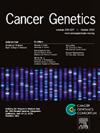61.经多组学生物信息学分析,MAP3K1 被确定为乳腺癌的预后生物标志物
IF 1.4
4区 医学
Q4 GENETICS & HEREDITY
引用次数: 0
摘要
尽管癌症研究取得了重大进展,但癌症仍然是一个重大的公共健康问题,乳腺癌是妇女死亡的主要原因之一。丝裂原活化蛋白激酶激酶1(MAP3K1)编码的丝氨酸/苏氨酸激酶在c-Jun N-末端激酶、丝裂原活化蛋白激酶和Nf-kappa-β通路中含量丰富,而这些通路都参与了肿瘤的发生。对从 cBioPortal 下载的 TCGA 和 METABRIC 数据集进行了多种统计检验,以分析 MAP3K1 与乳腺癌的相关性。此外还使用了其他工具,包括 TIMER 2.0、Kaplan-Meier Plotter、UALCAN 和 STRING,以进一步了解不同类型的全息数据中的 MAP3K1。结果表明,虽然 MAP3K1 改变在总体上相对不常见,但在乳腺癌中最为常见。这些改变大多包括截断突变,而且往往与 PIK3CA 的改变同时发生,而 PIK3CA 是乳腺癌研究中已经确立的生物标记物。生存分析表明,MAP3K1表达不足与患者生存率较低密切相关。MAP3K1在非裔美国人、三阴性乳腺癌患者和4期患者中表达不足,而其磷蛋白在这些人群中表达过高。限制 MAP3K1 磷蛋白表达的药物靶点或其他靶向治疗方案有可能改善患者的预后,尤其是上述人群。然而,人们对这种磷蛋白的了解还很有限,因此还需要解决这一知识缺乏的问题,并最终找到对抗其在乳腺癌中过度表达的方法。本文章由计算机程序翻译,如有差异,请以英文原文为准。
61. MAP3K1 identified as a prognostic biomarker in breast cancer after multi-omics bioinformatics analysis
Despite significant advances in cancer research, cancer remains a major public health concern, with breast cancer being one of the leading causes of death among women. The mitogen-activated protein kinase kinase kinase 1 (MAP3K1) codes for a serine/threonine kinase abundant in the c-Jun N-terminal kinase, mitogen-activated protein kinase, and Nf-kappa-β pathways, which are involved in tumorigenesis. Multiple statistical tests were conducted on the TCGA and METABRIC datasets downloaded from cBioPortal to analyze MAP3K1's relevance in breast cancer. Other tools, including TIMER 2.0, Kaplan-Meier Plotter, UALCAN, and STRING, were implemented to provide additional insight into MAP3K1 in different types of omics data. Results revealed that, though MAP3K1 alterations are relatively uncommon overall, they are most common in breast cancer. These alterations mostly included truncating mutations and often co-occurred with alterations in PIK3CA, an already established biomarker in breast cancer research. Survival analysis indicated that MAP3K1 underexpression was strongly associated with lower patient survival. MAP3K1 was underexpressed for African Americans, triple-negative breast cancer patients, and stage 4 patients, while its phosphoprotein was overexpressed for these demographics. Drug targets or other targeted therapy options that limit MAP3K1 phosphoprotein expression could potentially improve patient outcomes, especially for the aforementioned demographics. However, limited information is known about this phosphoprotein, so there is an unmet need to address this lack of knowledge and eventually find ways to combat its excessive expression in breast cancer.
求助全文
通过发布文献求助,成功后即可免费获取论文全文。
去求助
来源期刊

Cancer Genetics
ONCOLOGY-GENETICS & HEREDITY
CiteScore
3.20
自引率
5.30%
发文量
167
审稿时长
27 days
期刊介绍:
The aim of Cancer Genetics is to publish high quality scientific papers on the cellular, genetic and molecular aspects of cancer, including cancer predisposition and clinical diagnostic applications. Specific areas of interest include descriptions of new chromosomal, molecular or epigenetic alterations in benign and malignant diseases; novel laboratory approaches for identification and characterization of chromosomal rearrangements or genomic alterations in cancer cells; correlation of genetic changes with pathology and clinical presentation; and the molecular genetics of cancer predisposition. To reach a basic science and clinical multidisciplinary audience, we welcome original full-length articles, reviews, meeting summaries, brief reports, and letters to the editor.
 求助内容:
求助内容: 应助结果提醒方式:
应助结果提醒方式:


